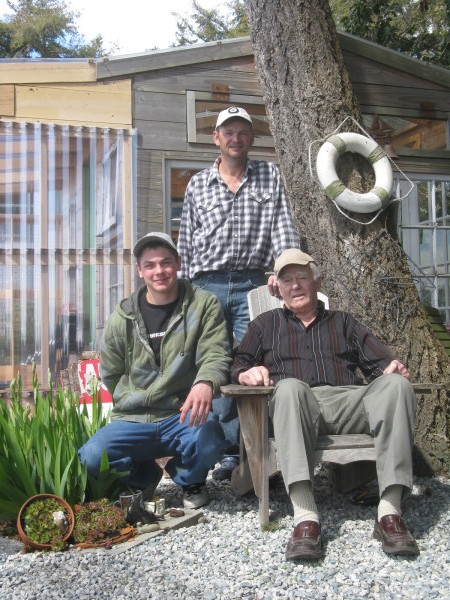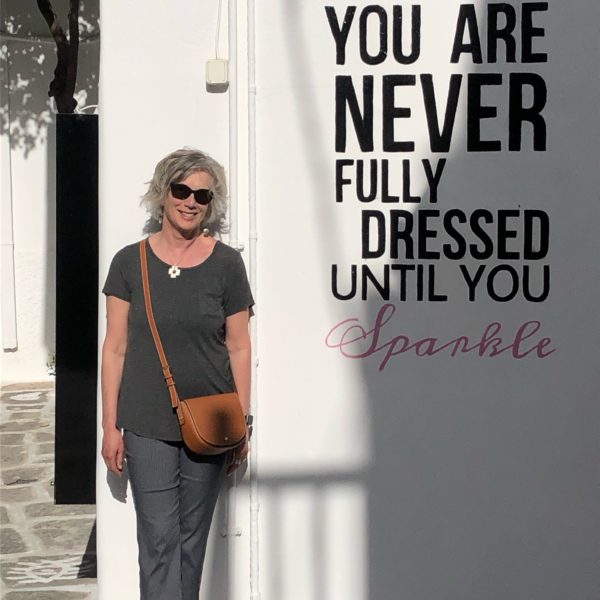“Don’t fence me in.
I can’t stand hobbles and I can’t stand fences.
Don’t fence me in.”
My dad could not carry a tune. This did not stop him from singing. He tunelessly sang this song, cobbling together bits of remembered or made-up verses, but mostly repeating the endless chorus of, Don’t Fence Me In.
At 33152 Cherry Street, piano practicing was the only music. And hymns. There were certainly hymns. Other bits of music found their way to us between the news and funeral announcements from the copper and cream coloured Phillips radio. But there was no record collection. No jazz, blues, operas or symphonies. We grew up with hymns and my dad and his song.
He’s told me this story many times. He was 19 and working on the binding machine for a farmer in MacGregor, Manitoba, sixty miles from his hometown of Lowe Farm. The town was almost twice the size of Lowe Farm, boasting two restaurants, three grain elevators and a theatre. He was in the MacGregor Cafe the night of his story, plugging the glowing Wurlitzer with his hard-earned coins. Over and over, he played what would become his life’s theme song, “Don’t Fence Me In.” Finally, a Canadian soldier, home on leave, punched the red Cancel button. Dad always laughs when he tells the ending.
Whenever he told me this story, I always imagined him as the man who was then my dad…but at 19, he wouldn’t have looked like the father I knew. He would have been a strapping tall Mennonite farm boy far away from home. He would be getting used to being called Hank instead of Heinrich. Black and white photos from later years show his gap-toothed smile and sinewy arms. The photos have silenced his laugh though his face is still caught in the animation of it, head thrown back, eyes twinkling, like he’d just told a funny.
At 19, he was a young man discovering this cowboy tune about places where you didn’t have to conform, didn’t have to share three beds with your eight brothers and where there was space to roam without bumping into your six elder sisters. A place where there were probably enough plates for everyone. Where maybe things weren’t so hard, so tight, and so rigid. A place that maybe existed near the edge of their world, that flat place his dad insisted you would fall off if you dared venture too far from home. Did Christ himself not speak of going into the four corners of the world?
At twenty-one, the man who became my dad headed away from the fenced flatlands of the Canadian prairies and into his freedom. Five young Mennonite men piled into Fred Doerksen’s navy blue 1937 Chevy. Hank had asked his employer if he could have three weeks off. After the reply, he had quit. In three days the Chevy arrived on the west coast of BC. At the end of their adventure, his friends headed home, returning to the familiar. Hank stayed in the valley town of Fred Doerksen’s parents.
Back in Lowe Farm, his father died, never having ventured more than 50 miles from the town of his birth. The brothers married local girls and moved to nearby towns. Two of his sisters continued their angry silence that only ended with their deaths.
In BC, after a three-month courtship, Hank married a Saskatchewan Mennonite woman. Their three daughters were born four years apart. Hank began his entrepreneurial life. He doodled endlessly while making deals. He shot rubber bands at his employees, looking away and chuckling when they turned. His hands never stopped fidgeting.
Later, he would be referred to as a self-made man. He would build a big house. Much later, he would be given the keys to the Fraser Valley city he lived in for 56 years.
“Send me off forever but I ask you please,
Don’t fence me in.”

The man in the recliner is 88-years old. He wears track pants that are too loose on his gaunt frame. He has no need of pockets. He no longer carries a wallet. His shirt holds dried bits from his breakfast. His sweater sags too long in the front. Beneath the smooth bandages on his hands is the torn Warfarin-thinned skin. His vision and hearing are almost gone. This is my father.
The Menno Home caregiver sees an elderly man. She hasn’t seen the photos or heard the stories or shared the jokes. She didn’t learn how to wield a hammer and build a tree-fort at this man’s side. She has no way of knowing that those frail hands once split cedar shakes, tamed horses, and soothed a child. She’s never heard him on the phone, cajoling, kidding, closing the deal, smacking his hands together and exclaiming, “Profit is not a dirty word!” She hasn’t seen his formidable anger, or the terror he could evoke in his children when he reached for the shingle on the top of the fridge. She never saw his sure grip on the wheel of his new Buick LeSabre or walked in his buffed and polished Sunday brogues. She’s never opened the ledger to read the long list of second hand cars he bought for widows and prisoner’s wives. She doesn’t realize who resides in this old man’s body.
Dementia. Depression. Anxiety. His eternal optimism has failed him and he is fenced in by his own mind now, a mind caged by worry and held in a body that holds no remembrance of its former strength. They say it started with his heart surgery. The strokes didn’t help. He is tired. His heart is broken. How, after so many years, could it be anything else?
I sit by my dad, resting my hand on his arm, tunelessly humming the song I learned so long ago.






I really enjoyed this and can just picture it. That is so my Uncle Hank. You have an awesome way of capturing time in your writing.
I don’t know where Grandpa Friesen got his notion of a flat earth but it most certainly wasn’t from reading his Bible.
I came across this 1 minute video clip and it brought to mind the reference to a flat earth that occasionally comes up.
https://www.youtube.com/watch?v=P_pDr8raLqg
Bible references to the four corners of the earth are best understood to refer to the four quadrants: North, South, East and West. Similarly, we use the terminology of the setting sun or sunset. Technically that would mean that the sun is revolving around the earth, which we know it is not.
Thanks Joan.
I like your observation about capturing time. It wasn’t something I consciously did. I’m going to re-read it to see what I did 🙂
I never met my Grandfather Friesen but Dad told me that story more than once, of how his dad worried that Dad went to far west, he’d fall off the edge.
Colleen, I think this is one of my favourite posts of yours, ever. It reads like a novel, and I want more. Have you ever thought about writing a book just about your childhood and your family?
Oh Laurie. Thank you. I have indeed, and as my former writing group would attest, done about a million versions and styles of it. It’s shelved, yet again, as I mull over another way of presenting it all. It may, or may not, ever see the light of day!
This is a beautiful piece of writing.
How much you must love your Dad!
Despite the dementia and the depression he is still the same person that you have known and loved and what counts are the beautiful memories that you have of him.
Thank you for your kind words Catherine. I’m glad the love comes through.
He’s always been a larger-than-life man. I’m doing my best at meeting him where he is right now.
Wonderful story. I would love to hear more about his younger days. I always appreciated his even temper and sayings like ” ahh it’s a piece of cake” . His cheeky laugh . When he used to drive it was a little scary to be his passenger, unless there was snow, then he was the best driver around !
He has outlived 90% of his siblings, an achievement I think he is proud of. He is a blessing to our family. Even though he has dementia his personality hasn’t changed. He is still kind , interested, and appreciative.
You were a lucky girl to have him as your dad from birth.
Joanna, I’m so glad that you had time to get to know him.
It’s interesting that you talk about his even temper. It wasn’t quite so even when he was younger. I always felt I understood the story of Jesus clearing the temple better than anyone who hadn’t lived with my dad.
Like you, I appreciated his ‘can-do’ attitude. My favourite saying is, “Why not?”. I use it daily. He lived that motto his whole life and planted it deep in my cells 🙂
I agree that he has been, and continues to be, a huge blessing.
I am going to miss him so much. It is comforting to know that, for so many of the same reasons, you will too.
Thanks for writing…
Beautifully written, Colleen. Driving on the prairies and especially through Wyoming (well, as a passenger), I’ve always felt that those of us on the road were the ones fenced in on a narrow path. Sad to hear your father is in such poor shape but it’s still a lovely picture of him with the two younger men.
That’s why I love that story so much Lesley. I can see that old car blasting across Canada with those wide-eyed farm boys on their big adventure. So many good stories. I guess in the end, that’s all we have.
Beautifully written Colleen. Even if I didn’t know Hank I would feel as though I did after reading this. That childlike mischievous, chuckle of his has always been one of my favorite qualities. Life feels so cruel when you have to watch such a great man fade away slowly and my heart breaks for him and for you. I hope that the treasured memories help ease the sadness a little for both of you.
Sarah, it’s true that the memories help a lot. I’m glad you knew the version of him with the twinkle in his eye.
Life is such an amazing journey. If we’re lucky, we’ll have as many chapters in our lives as Hank.